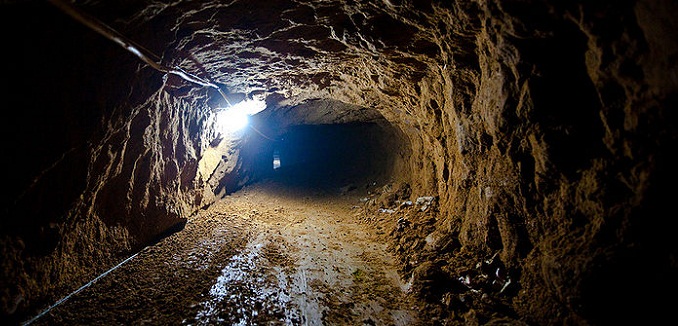The Egyptian army’s ongoing campaign to uproot jihadist infrastructure in the Sinai Peninsula has in recent days focused heavily on the territory’s border with the Hamas-controlled Gaza Strip. The military has begun demolishing buildings within a kilometer of the border, hoping to locate hidden tunnels which are used to move personnel and weapons between the two areas.
Security officials claim that over 150 tunnels have been destroyed since June 30, but large parts of the underground smuggling infrastructure remains. Hamas partly relies on that infrastructure to fund itself and to keep the Gaza Strip economy afloat, and has an interest in keeping the tunnels open. Washington and Cairo – both of which are aligned against Hamas and its Iranian sponsors – have the opposite interest.
Relatedly, news arrived today that the U.S. Department of Defense has awarded a nearly $10 million contract to defense contractor Raytheon to provide Egypt with cutting-edge tunnel detection technology:
On detection, the Egyptian authorities will plug these tunnels which were abused by terrorists to smuggle arms across the border into Gaza for use against Israel. According to rough estimates, nearly 2,000 tunnels still exist in the Egypt and Gaza border… The primary problem is their detection, as these tunnels are concealed very craftily… Raytheon with its advanced sensor technology and MONARCH-equipped sensor on the Seismic and Acoustic Vibration Imaging program will be able to detect more tunnels, invisible to human eyes. The destruction of these tunnels will be a major counter-terrorist move, easing to some extent the violence that has despoiled the region.
Military-to-military ties between the U.S. and Egypt stretch back decades, and Egypt is described by the State Department as “the United States’ most reliable and influential Arab ally.” The New York Times recently described the array of advantages that the U.S. military gets from the alliance:
Most nations, including many close allies of the United States, require up to a week’s notice before American warplanes are allowed to cross their territory. Not Egypt, which offers near-automatic approval for military overflights, to resupply the war effort in Afghanistan or to carry out counterterrorism operations in the Middle East, Southwest Asia or the Horn of Africa… American warships are also allowed to cut to the front of the line through the Suez Canal in times of crisis, even when oil tankers are stacked up like cars on an interstate highway at rush hour. Without Egypt’s cooperation, military missions could take days longer.
Those are some of the largely invisible ways the Egyptian military has assisted the United States as it pursues its national security interests across the region.
[Photo: Hovbshira / Wiki Commons]




